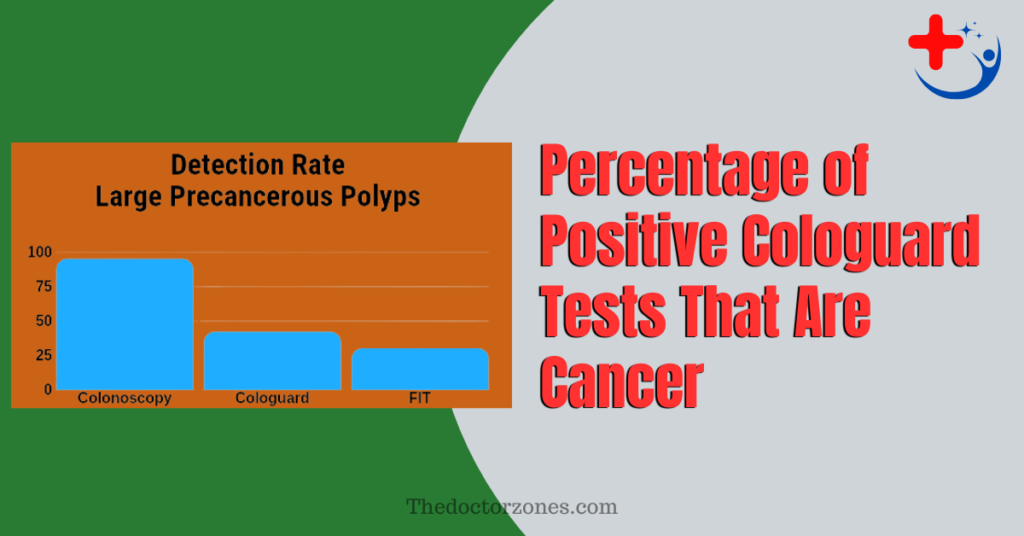What Percentage of Positive Cologuard Tests Are Cancer
Cologuard demonstrates a greater sensitivity in detecting colorectal malignancies compared to the fecal immunochemical test (FIT), with a sensitivity rate of 92% for Cologuard as opposed to 74% for FIT. However, it’s worth noting that the false positive rate associated with Cologuard is higher, which means that there is a greater likelihood of obtaining erroneous positive results.
Cologuard is an increasingly popular method for colorectal cancer screening that uses advanced DNA technology to detect changes in the stool that may indicate cancer or precancer. Understanding what a positive Cologuard test means is crucial for patients and healthcare providers to make informed decisions about further diagnostic procedures. Read about How Can Mold Cause Cancer
What is Cologuard?
Cologuard is a non-invasive, at-home stool DNA test approved by the FDA for colorectal cancer screening. It detects the DNA from cancer or precancerous polyps in the stool, combined with the presence of blood, to help determine the need for further diagnostic testing.
How Does Cologuard Work?
The test identifies changes in the DNA that could be indicative of cancer cells shedding into the colon. It also detects hemoglobin, a component of blood, which can be a sign of cancer or large polyps. Also read the Article: Breast Cancer Screening ICD 10
Accuracy of Cologuard
Cologuard has been shown to have a sensitivity of about 92% for detecting colorectal cancer, with a specificity of approximately 87%. This compares favorably to other non-invasive tests but less so to invasive methods like colonoscopy.
Interpreting a Positive Cologuard Test

A positive result does not necessarily mean cancer. It indicates that further testing, usually a colonoscopy, is recommended to investigate the source of the detected changes.
Percentage of Positive Tests Indicating Cancer
Clinical studies have shown that approximately 4% of individuals with a positive Cologuard test will have colorectal cancer, and about 40% will have advanced adenomas or precancerous polyps.
Factors Influencing Cologuard Results
Diet, medications, and other health conditions can affect the accuracy of Cologuard results, potentially leading to false positives or false negatives.
Benefits of Cologuard Testing
Its non-invasive nature and ease of use make Cologuard an attractive option for many who might otherwise forgo screening.
Limitations and Considerations
The test does have limitations, including a higher rate of false positives compared to more invasive tests. Understanding these can help manage expectations and follow-up plans.
Follow-Up Procedures After a Positive Test

A positive Cologuard test is typically followed by a colonoscopy to confirm the presence of cancer or precancerous conditions.
Patient Stories and Testimonials
Many patients have shared their positive experiences with Cologuard, highlighting its ease of use and how it has impacted their health decisions.
Latest Research on Cologuard
Recent studies continue to assess the long-term benefits and limitations of Cologuard, focusing on improving its accuracy and reducing false positives.
Alternative Colorectal Cancer Screening Tests
There are several alternatives to Cologuard, including traditional colonoscopy, FIT tests, and virtual colonoscopy. Each has its benefits and limitations.
Conclusion
Understanding the implications of a positive Cologuard test is essential for effective cancer screening and prevention. It’s a powerful tool that, when used correctly, can save lives by enabling early detection and treatment of colorectal cancer.
FAQs
Q. How often should I take the Cologuard test?
A. Cologuard is typically recommended every three years for individuals at average risk. However, your doctor may adjust this based on your personal health history.
Q. What should I do if I get a positive result?
A. If you receive a positive result, schedule a follow-up colonoscopy as soon as possible to determine the cause of the abnormal findings.
Q. Is Cologuard covered by insurance?
A. Many insurance plans cover Cologuard for eligible individuals. Check with your provider to confirm your coverage.
Q. Can lifestyle changes affect test results?
A. Certain foods and medications can influence the results. Follow pre-test guidelines from your healthcare provider to ensure accuracy.
Q. How does Cologuard compare to other non-invasive tests?
A. Cologuard is one of the more comprehensive non-invasive tests available, combining DNA and blood marker detection. However, it’s important to discuss all screening options with your doctor to determine the best choice for you.








